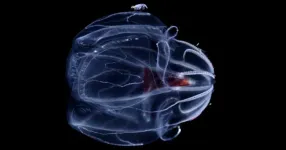(Press-News.org) Extreme weather events such as hurricanes and storms have increased in both frequency and severity in recent years.
With that has come heightened public interest, resulting in often dramatic footage being live-streamed on platforms such as YouTube, TikTok and Discord.
Now, a new study conducted at the University of Plymouth has for the first time analysed what might be motivating people to watch these streams – in some instances for up to 12 hours at a time.
The research centred around the live-streaming of three events – Hurricane Irma in 2017, Hurricane Ian in 2022, and Storms Dudley, Eunice and Franklin in 2022.
Through a detailed analysis of viewers’ comments, it was found that people in affected areas were using streams to discuss official government risk advice they had received – for example, about whether to evacuate.
Others were drawn to the streams because they had a previous connection to the affected region. For these people, watching live footage – which included taking time to share messages of ‘hope’ for the hurricane or storm to pass without destruction – was a way of showing support to places and people impacted by the event.
The research was published in the journal Environmental Hazards and conducted by Dr Simon Dickinson, Lecturer in Geohazards and Risk in the University’s School of Geography, Earth and Environmental Sciences.
He said: “When dramatic things happen – whether that relates to extreme weather or events like tornados or volcanoes erupting – people flock to watch. You might assume that this is just a form of online ‘rubber-necking, and that people are naturally drawn to spectacular sights. However, this study has shown that the drivers to watch extreme weather footage are more complex. Live-streams provide the opportunity for people in, close to, and far away from the event to interact in real time. The footage becomes a marker that people use to sense-check their understandings of how significant the event is, how hazards work, and as an online gathering point to share experiences of similar events. It is a fascinating insight into human behaviour that has previously been unexplored.”
The research focused on nine live-streams of the 2017 and 2022 hurricanes and storms, which broadcast a total of 65 hours of video footage watched by more than 1.8million people.
During that time, over 14,300 comments were left by 5,000 unique accounts, a reflection of the fact that footage focused on unfolding events of national or global importance generate higher-than-normal audience engagement.
Many of the streams were already existing webcam channels that were repurposed during the hurricane or storm, such as webcams that streamed beach or port conditions. In some instances, affected people streamed live-footage from their own house security or doorbell cameras.
The study demonstrates that people are keen to learn more about the science behind what is happening, highlighting the need for further work that examines how people are using new technologies to make sense of hazard risk.
Dr Dickinson added: “Although scientists are getting better at communicating risk, people are far more likely to discuss hazards in informal and relatively unmoderated settings. Moments of extreme weather are important because they focus people’s attention and generate discussion about hazards, how they work, and how they will increasingly affect us in future. New digital practices – such as live-streaming – are thus important for us to understand because they’re not just spaces of disaster voyeurism. Rather, they’re spaces of learning, community and emotional support in a world that can feel increasingly volatile.”
END
Study explores what motivates people to watch footage of disasters and extreme weather
2024-07-02
ELSE PRESS RELEASES FROM THIS DATE:
Ocean acidification turns fish off coral reefs
2024-07-02
A new study of coral reefs in Papua New Guinea shows ocean acidification simplifies coral structure, making crucial habitat less appealing to certain fish species.
While much media attention has focused on heat stress-induced coral bleaching, this finding, by a University of Adelaide research team led by Professor Ivan Nagelkerken, adds nuance to concerns about how global warming affects coral reefs.
Ocean acidification is caused by an increase in the level of carbon dioxide in oceanwater, leading to a reduction in pH. This makes calcium carbonate less available in the ocean, which corals use to build and repair their skeleton.
Professor Nagelkerken and ...
Will the Paris 2024 Olympics be a platform for activist protests amid global tensions?
2024-07-02
Athletes and sporting teams have frequently used the Olympics and other sporting events to make political statements through boycotts and protests. Ahead of the Paris Olympics kicking off this month and amidst the current UEFA (Union of European Football Associations) European Football Championship (Euro 2024), researchers are asking – should sport be a platform for promoting social justice issues?
The 2024 Paris Olympics, like the Euro 2024 soccer tournament, will be watched by billions of people and command media attention around the globe. ...
Mechanism of lupus pathogenesis unveiled
2024-07-02
A research team of Professor Yoontae Lee and Jiho Park, a PhD candidate, from the Department of Life Sciences at Pohang University of Science and Technology (POSTECH) recently discovered that a particular protein promotes the development of systemic lupus erythematosus (SLE). The study was published in the Proceedings of the National Academy of Sciences of the United States of America (PNAS), one of the world's most-cited multidisciplinary scientific journal.
B cells, components of the body's ...
How well do deep-sea animals perform under pressure?
2024-07-02
A multi-institutional team that includes researchers from the University of Delaware, University of California San Diego and Monterey Bay Aquarium Research Institute (MBARI), among others, published a paper in Science on Thursday, June 27, that provides new insight on how deep-sea “comb jellies” called ctenophores adapt and survive at extreme pressures.
It turns out that part of the adaptation involves lipids, fatty chemical compounds found in the membrane of all living cells that perform essential functions, including storing energy, sending signals and controlling what passes through ...
FDA staff leaving for industry jobs given “behind the scenes” lobbying advice
2024-07-02
The US Food and Drug Administration (FDA) tells staff leaving for industry jobs that, despite restrictions on post-employment lobbying, they are still permitted to influence the agency, reveals an investigation by The BMJ today.
Internal emails, obtained under a freedom of information request, show how two FDA officials who worked on covid-19 vaccine approvals were proactively informed by FDA ethics staff about their ability to indirectly lobby the agency as they left for jobs with Moderna.
The record shows that since 2000 every FDA commissioner, the agency’s highest position, has gone on to work ...
Herpes infections take major economic toll globally, new research shows
2024-07-02
Genital herpes infections and their related complications lead to billions of dollars in health care expenditures and productivity losses globally, according to the first ever global estimates of the economic costs of these conditions.
The paper, which publishes July 1st in the journal BMC Global and Public Health, calls for greater investment in prevention of herpes transmission, including concerted efforts to develop effective vaccines against this common virus.
Corresponding author Nathorn Chaiyakunapruk, PharmD, PhD, professor of pharmacotherapy, and Haeseon Lee, PharmD, research fellow in pharmacotherapy, both at the College of Pharmacy of University ...
Tax on antibiotics could help tackle threat of drug-resistance
2024-07-02
Taxing certain antibiotics could help efforts to tackle the escalating threat of antibiotic resistance in humans, according to a new study by the University of East Anglia’s Centre for Competition Policy, Loughborough University and E.CA Economics.
Antimicrobial resistance (AMR) poses a significant global risk, causing an estimated 700,000 deaths annually. A key AMR report previously warned that if unchecked, it could endanger 10 million lives a year and result in $100 trillion in lost economic output ...
Organic material from Mars reveals the likely origin of life’s building blocks
2024-07-01
Organic material from Mars reveals the likely origin of life’s building blocks
Two samples from Mars together deliver the "smoking gun" in a new study showing the origin of Martian organic material. The study presents solid evidence for a prediction made over a decade ago by University of Copenhagen researchers that could be key to understanding how organic molecules, the foundation of life, were first formed here on Earth.
In a meteor crater on the red planet, a solitary robot is moving about. Right now it is probably collecting soil samples with a drill and a robotic arm, as it has quite ...
Light targets cells for death and triggers immune response with laser precision
2024-07-01
CHAMPAIGN, Ill. — A new method of precisely targeting troublesome cells for death using light could unlock new understanding of and treatments for cancer and inflammatory diseases, University of Illinois Urbana-Champaign researchers report.
Inflammatory cell death, knows as necroptosis, is an important regulatory tool in the body’s arsenal against disease. However, in some diseases, the process can go haywire; for example, cancer cells are able to suppress inflammatory signals and thus escape death.
“Usually treatments for cancer use pharmacological ...
Dr. Harish Manyam revolutionizes cardiac care with innovative device
2024-07-01
Harish Manyam, MD, is on a mission to improve the lives of people with heart problems. His recent accomplishment of implanting Tennessee’s first atrial leadless pacemaker is a step toward that, marking a significant advancement in cardiac care and promising safer and more effective treatment for patients.
The leadless pacemaker, in combination with a novel subcutaneous defibrillator, forms a groundbreaking system that addresses potentially dangerous problems associated with traditional pacemakers and defibrillators.
“This is a great leap forward for the field,” said Dr. Manyam, interim chair of the Department of Medicine at the ...






